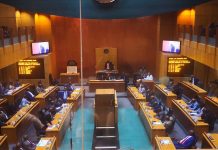Africa-Press – Botswana. Healthcare workers are sounding the alarm over a looming wave of trauma in hospitals, following the government’s blunt admission that it can no longer support the collapsing health system, leaving patients to fend for themselves.
The Ministry of Health (MoH) has failed to provide clear guidance or a contingency plan for healthcare workers, particularly nurses and doctors, regarding how to manage patients without essential medications and other medical supplies, the Botswana Nurses Union (BONU) has said.
According to the president of BONU, Peter Baleseng, this failure is impacting the mental well-being and already low morale of frontline staff severely.
This follows a recent press release from MoH acknowledging an acute shortage of essential drugs for treatment of life-threatening conditions at Botswana’s public health facilities as well as the financial incapacity to intervene on essential treatment options for lifesaving procedures.
Awkward position
Speaking in an interview, Baleseng said in the face of this crisis, the government should have at least offered guidance on how to navigate the situation during medical care.
“The government has placed healthcare providers in an extremely awkward and painful position,” he said. “This lack of leadership and intervention leaves us helpless on the frontlines.”
He added that the situation is worsening the psychological burden on healthcare workers who are forced to face patients in need of treatment that they cannot provide. “The morale among nurses and doctors is already low due to various systemic issues,” said Baleseng.
“Our hands are tied”
“Having to watch patients deteriorate or even die, not because of incompetence but due to lack of medicines, is mental torture. We have the training and ability to help, but without the necessary resources, our hands are tied.”
He urged the government to act swiftly and transparently to mitigate the impact of the shortages and to provide emotional and professional support to healthcare workers, who are concerned that this could lead to a significant spread of communicable diseases like TB.
“Healthcare providers need clarity, support and tools, not just acknowledgment of the problem,” he said. “If no urgent steps are taken, we risk not only the lives of patients but the well-being and resilience of the very people entrusted to save them.”
Hypertension, cancers, diabetes
According to the Ministry of Health, the medicines currently in short supply include those for hypertension, cancers, diabetes, eye conditions, asthma, tuberculosis (TB), and mental health disorders, HIV/Aids medications etc.
Reached for comment, the Chairman of the Parliamentary Health Committee, Phillimon Aron, expressed shock at MoH’s press release.
“As the committee responsible for public health, we were never consulted before this statement was issued,” he said. “Normally, before these kinds of decisions are made after consultation.”
Panic mode
Aron added that the statement alone suggests that the government is in panic mode and uncertain about how to respond. “It seems people with chronic illnesses have been written off because if there is no medication for them, there is nothing that doctors and nurses can do,” he said.
“We are going to witness many devastating consequences from these drug shortages.”
Briefing Parliament yesterday, the Minister of Health, Dr Stephen Modise attributed the crisis to dry coffers: “Although the Ministry of Health was allocated BWP 254 million for medical fees for the 2025/2026 financial year, the funds have already been depleted, having been used to clear outstanding debts. Patients, however, continue to require these life-saving treatments. There is therefore an urgent need for additional funding to sustain services and to procure essential medicines.”
A health expert who preferred anonymity expressed concerns at the situation saying: “The financial crisis found the drug shortage problem already a big problem. It’s also a matter of a broken-down procurement system and supply chain management.”
He continued: “You would have to look at the budget, whether the money is or was spent on what is budgeted for. Does the budget make sense when one looks at the GDP per capita? Regarding drugs, how do they decide who to purchase from and which drugs to buy. How do they distribute the drugs? It’s a complex thing because the whole system seems to have broken down. So many patients are referred to Private Hospitals, even the ones that Government Referral Hospitals should be able to deal with.”
Source: Botswana Gazette
For More News And Analysis About Botswana Follow Africa-Press






